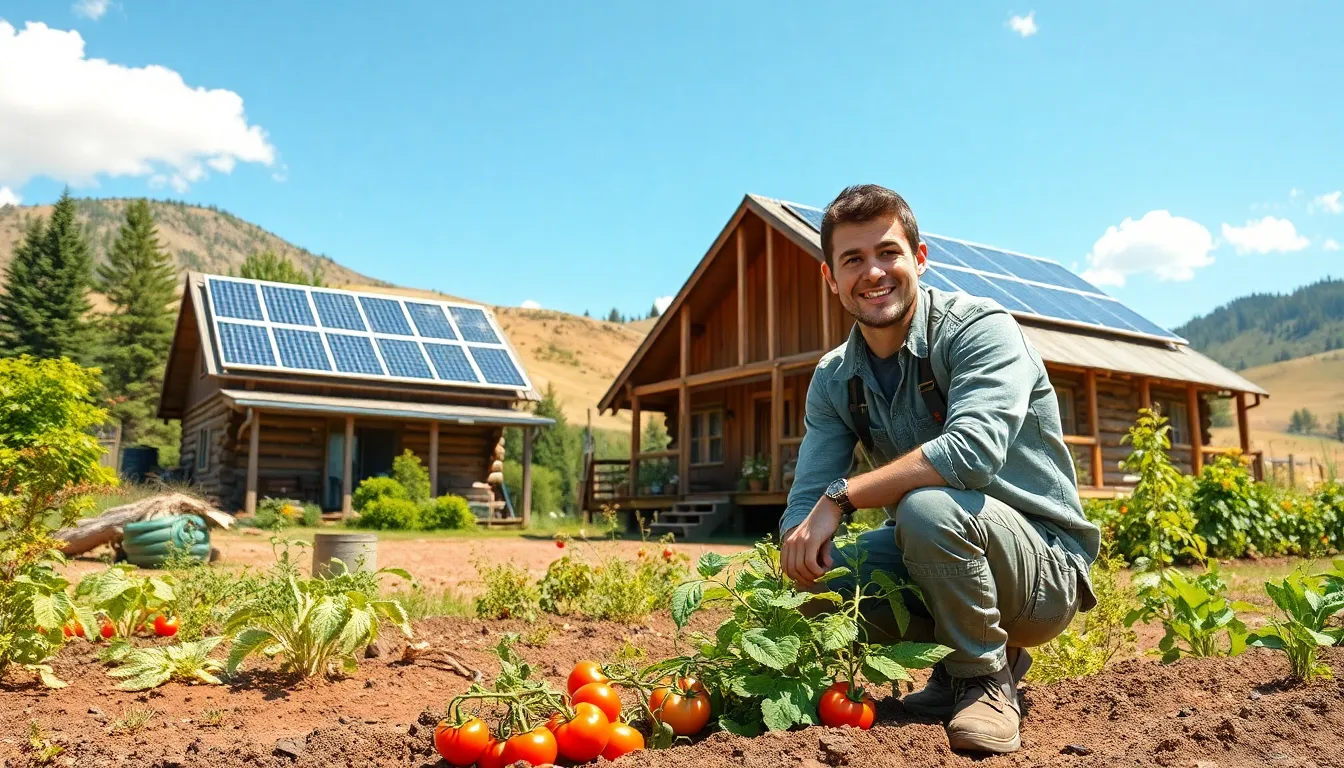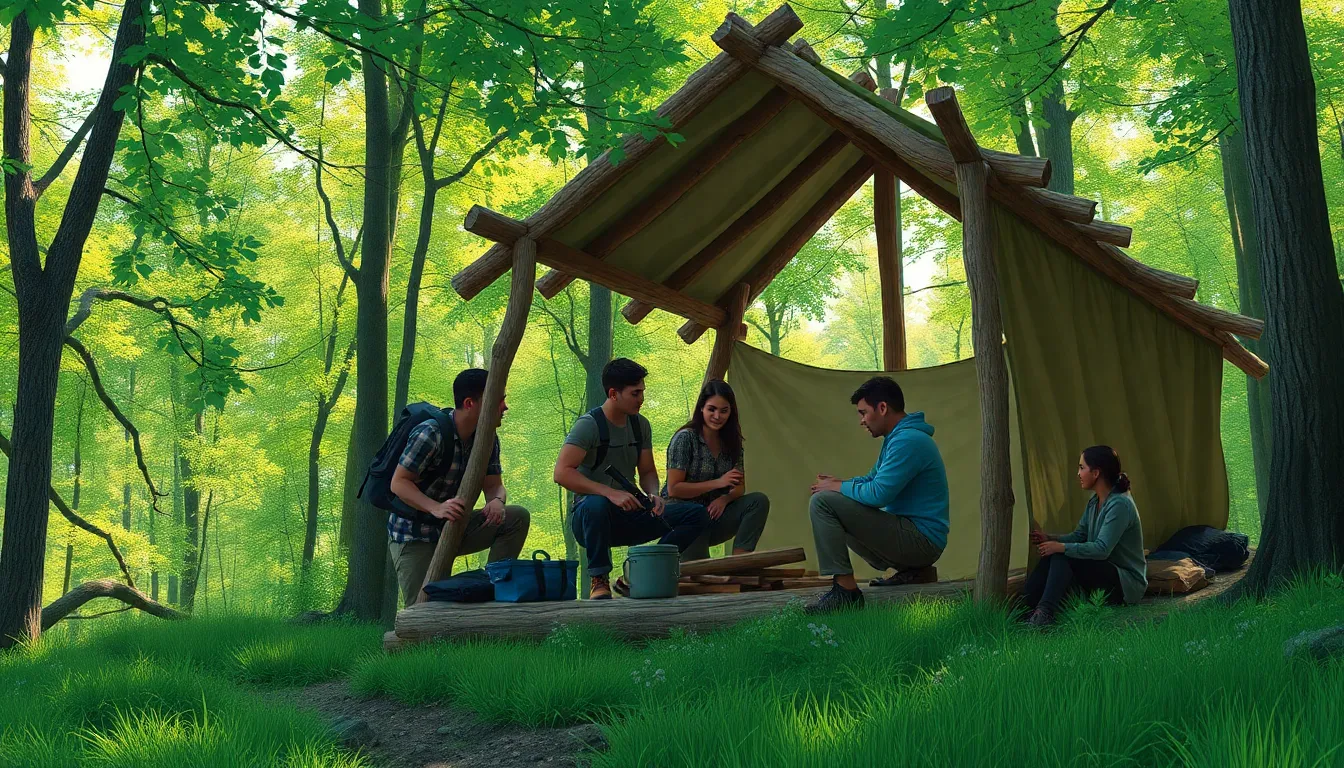Physical Address
304 North Cardinal St.
Dorchester Center, MA 02124
Physical Address
304 North Cardinal St.
Dorchester Center, MA 02124

Imagine trading your daily commute for a cozy cabin in the woods, where the only traffic jam involves a family of deer. Living off the grid TV shows have captured viewers’ imaginations, showcasing the thrill of self-sufficiency and the occasional mishap with a stubborn goat. These programs aren’t just about survival; they’re a hilarious dive into the challenges and triumphs of those who dare to disconnect from the chaos of modern life.
From solar panels to homemade compost toilets, these shows offer a blend of inspiration and entertainment. They prove that while life without Wi-Fi might sound daunting, it can also lead to unforgettable adventures and a few good laughs. So grab your popcorn and get ready to explore how living off the grid can be both an exhilarating escape and a masterclass in improvisation.
Living Off the Grid TV Show highlights the journey of individuals and families embracing a self-sufficient lifestyle outside conventional society. Each episode showcases unique approaches to sustainable living, featuring various locations, techniques, and innovations. Viewers gain insights into solar energy systems, rainwater harvesting methods, and natural building practices, essential for off-grid living.
The show introduces diverse characters who navigate the challenges and rewards of their new way of life. Whether constructing shelters or foraging for food, participants share their experiences, offering relatable moments and practical solutions. Some episodes focus on innovative homesteading skills like gardening, cooking, and animal husbandry, showcasing how viewers can apply similar methods in their own lives.
A blend of humor and tension unfolds as families encounter obstacles such as harsh weather and equipment failures. Each situation provides valuable lessons about adaptability and resilience, essential traits for anyone considering off-grid living. The narratives create a sense of community among participants, demonstrating that support and collaboration enhance the off-grid experience.
With each season, the show evolves, exploring advanced technologies aimed at increasing efficiency and sustainability. Examples include permaculture principles and regenerative agriculture, expanding the viewers’ perspective on what off-grid living can entail. As more people become interested in eco-friendly living, this program emerges as a vital resource, inspiring a broader audience to explore sustainable lifestyles.

Numerous shows have captivated audiences with the theme of living off the grid. Each program provides unique insights into self-sufficiency and sustainable living.
Living Wild: Off the Grid features a group of individuals who embrace a challenging lifestyle away from modern conveniences. Each episode focuses on their struggles with basic survival skills. Viewers witness the importance of adapting to the environment through problem-solving and teamwork. The show highlights impressive skills such as building shelters and foraging for food. Captivating moments arise when participants confront unforeseen challenges. Humor often surfaces, lightening the mood amid adversity. Skills demonstrated resonate with those interested in sustainable practices. Overall, the series serves as an inspiring guide for aspiring off-grid enthusiasts.
Alaska: The Last Frontier showcases the Kilcher family as they live sustainably in the Alaskan wilderness. The program details their daily routines, from livestock management to food preservation. Each episode captures the spirit of resilience, depicting the family’s efforts to thrive in a challenging climate. Techniques used in gardening and hunting illustrate self-sufficiency at its finest. Viewers gain a deeper appreciation for the hard work required to live off the land. Emotional moments reveal the bonds forged through shared labor and survival. Insights into traditional crafts and modern innovations create an engaging viewing experience.
Living off the grid involves numerous key themes that encapsulate self-sufficiency and sustainable practices. The “Living Off the Grid” TV show portrays individuals and families who embrace this lifestyle, showcasing their unique strategies for independence. Solar energy systems often serve as a foundational element for powering homes, while rainwater harvesting delivers essential water resources.
Gardening techniques play a significant role, promoting organic food production and exemplifying self-reliance. Cooking methods featured on the show highlight creative approaches to meal preparation using homegrown ingredients. Animal husbandry appears as another essential skill, where participants raise and care for livestock, further cementing their connection to their environment.
Adaptability becomes a recurring theme as families confront challenges that arise from severe weather conditions and equipment malfunctions. Resilience shines through as they find practical solutions to unexpected setbacks.
The series often balances humor with tension, providing relatable moments that resonate with viewers. Personal stories foster emotional connections, highlighting the trials and triumphs of off-grid living.
Advanced technologies also find their place within these narratives. Innovations aimed at increasing efficiency and sustainability showcase how modern solutions integrate seamlessly into traditional practices.
Another notable show, “Living Wild: Off the Grid,” emphasizes survival skills, advocacy for teamwork, and the importance of community support in overcoming adversities. “Alaska: The Last Frontier” captures the Kilcher family’s efforts in the Alaskan wilderness, focusing on their daily routines, traditional crafts, and the labor behind their self-sufficient lifestyle. These themes collectively navigate the intriguing journey of off-grid living, offering valuable insights for those interested in pursuing a similar path.
Living off the grid fosters a deep connection with nature and independence from modern society. Viewers of the “Living Off the Grid” TV show observe individuals confronting the realities of self-sufficiency. Life without conventional resources means adapting to new methods of energy, food production, and waste management. Solar energy systems often serve as the backbone of this lifestyle, powering homes and devices sustainably.
Rainwater harvesting becomes essential in securing water for daily use. Gardening practices teach individuals how to grow organic food, significantly reducing reliance on grocery stores. Homemade meals crafted from homegrown ingredients create a sense of accomplishment and creativity. Animal husbandry introduces responsibilities that strengthen ties to the environment and enable families to harvest eggs and milk.
Challenges frequently arise, such as unpredictable weather and equipment failures. Families learn to navigate these obstacles with problem-solving skills and teamwork. Emotional bonds strengthen through shared labor and collaborative efforts to overcome adversity. Engaging moments captured in shows like “Alaska: The Last Frontier” showcase the joys and trials of rural living.
As the narrative unfolds, audiences witness the integration of advanced technologies in off-grid settings. Innovations enhance efficiency, promote sustainability, and offer practical solutions. Embracing these modern tools alongside traditional practices creates a well-rounded view of off-grid living. Overall, the impact of this lifestyle extends beyond mere survival; it inspires a sustainable mindset and encourages viewers to reconsider their relationship with the environment.
Focus on learning essential skills before diving into off-grid living. Knowledge of gardening techniques helps ensure a sustainable food supply. Understanding animal husbandry fosters a strong bond with the environment while providing nourishment.
Invest in renewable energy solutions, such as solar panels or wind turbines. These technologies minimize reliance on traditional power sources. Rainwater harvesting systems play a crucial role in maintaining self-sufficiency.
Embrace adaptability in facing unexpected challenges. Recognizing that severe weather or equipment malfunctions might happen prepares individuals for resilience. Cultivating problem-solving skills leads to more effective solutions during tough times.
Create a supportive community of like-minded individuals. Engaging with others allows for sharing resources, skills, and experiences. Building strong connections enhances the overall off-grid experience.
Practice resourcefulness by utilizing available materials for homesteading projects. Repurposing items can lead to innovative solutions and reduce waste. Thinking creatively encourages sustainable practices that minimize environmental impact.
Explore local resources for workshops and training opportunities. Attending classes on essential skills accelerates learning. Many communities offer valuable resources that empower aspiring off-grid dwellers.
Set realistic goals to navigate the transition smoothly. Gradual shifts toward self-sufficiency make the process manageable. Documenting progress fosters motivation and clarity in the journey.
By prioritizing these tips, individuals can embrace the off-grid lifestyle successfully. Engaging with online forums or local groups enhances learning and growth. Overall, small steps lead to significant changes in embracing self-sufficient living.
Living off the grid offers a unique blend of adventure and self-sufficiency that resonates deeply with many. The TV shows exploring this lifestyle not only entertain but also inspire viewers to rethink their relationship with modern conveniences. By showcasing practical skills and innovative solutions, these programs highlight the joys of sustainable living.
As families navigate challenges and celebrate successes, they embody resilience and adaptability. The journey toward self-sufficiency can be daunting yet rewarding, encouraging individuals to embrace nature and foster a deeper connection with their environment. For those intrigued by the off-grid lifestyle, these shows serve as both a guide and a source of motivation, paving the way for a fulfilling and eco-friendly life.